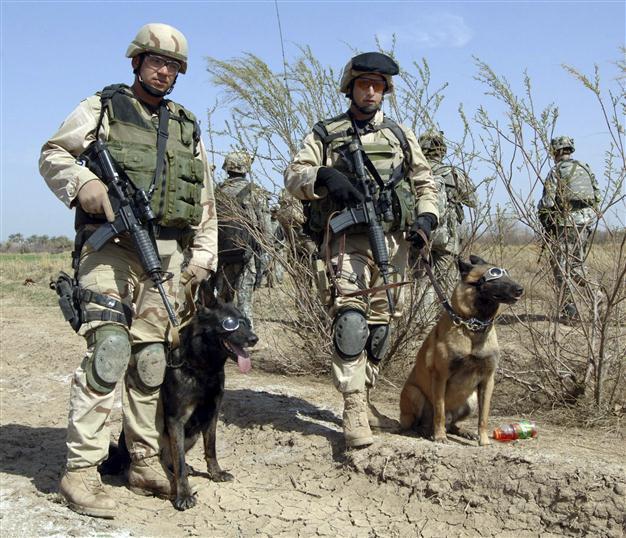Dogs of war also suffer from stress
SAN ANTONIO - Reuters

As U.S. troops return from Iraq and Afghanistan, many are coming home with mental and emotional damage brought on by war, and not just the human soldiers. REUTERS Photo
As U.S. troops return from Iraq and Afghanistan, many are coming home with mental and emotional damage brought on by war, and not just the human soldiers.Crews at Lackland Air Force Base, where all of the military’s working dogs are trained, say they are beginning to notice post-traumatic stress disorder (PTSD) in dogs as well.
“Where they were once very outgoing and very sure of their work, now they want to avoid contact,” said Colonel Kelly Mann, a veterinarian who runs the Holland Working Dog Hospital at Lackland, which treats ailments and diseases affecting America’s four-legged service members.
Canine PTSD symptoms are very similar to symptoms humans experience, he said, including startled reaction to loud noises, panic attacks, sleep problems and loss of social ability.
Mann said it’s not surprising dogs would suffer from PTSD just like their human counterparts.
“They work in tandem with our service members, so they are exposed to the same environmental problems and challenges,” he said Ruters on Dec. 2.
Dogs are trained to sniff out improvised explosive devices and insurgent weapons caches, track and spot insurgent troops, search for U.S. soldiers missing from their units and protect their handlers, as well as perform traditional sentry duty.
About 500 military working dogs are produced at Lackland’s kennel each year. Most are Labradors, but other breeds like Belgian Malinois are also used.
“These animals are part of our Air Force family, and we feel they deserve the finest treatment possible for the conditions they suffered in combat,” said Gerry Proctor of the 37th Training Wing at Lackland.
“They are also veterans, and we are committed to providing them with the same care all U.S. veterans receive.”
Everything from a little more play time and down time to more love from humans can help working dogs suffering from PTSD, Mann said.
But sometimes, the working dogs are prescribed anti-anxiety medications like Xanax given to human PTSD patients, he said.
“Because these dogs mean so much to the handlers, to the units they support, that’s why we give them this level of veterinary care,” Proctor said.
About 5 percent of working dogs returning from the war zones are diagnosed with PTSD, he said.
















